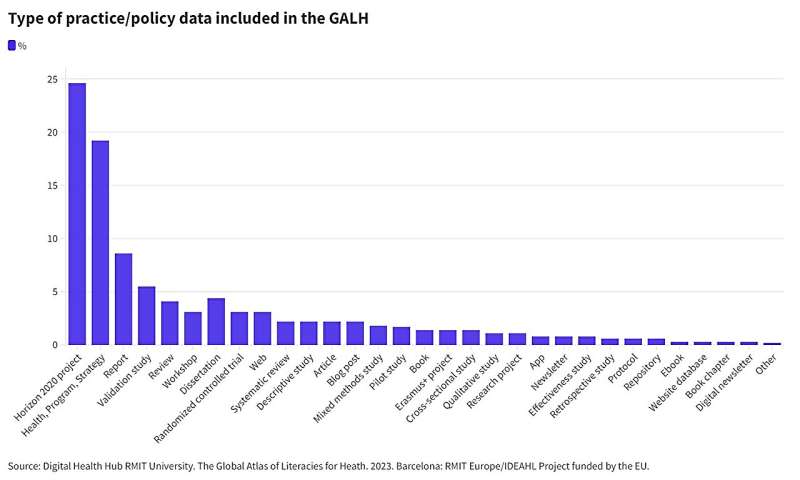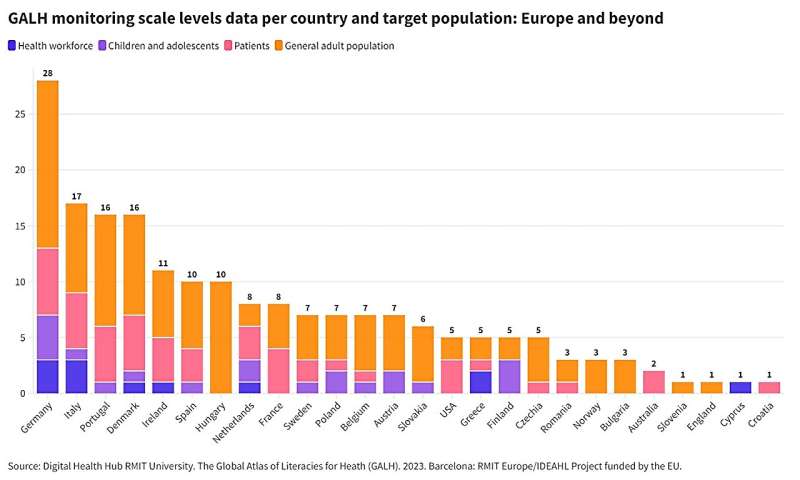This article has been reviewed according to Science X's editorial process and policies. Editors have highlighted the following attributes while ensuring the content's credibility:
fact-checked
trusted source
proofread
New tool maps previously uncharted global health and digital literacy data

Researchers at RMIT University have helped map European health and digital health literacy, in an important step towards informing health policy and practice across the region.
From the humble pedometer to smartwatches that warn of heart problems, we've been using digital technology to help make health decisions for decades.
But despite its enormous potential in addressing health care challenges, an accessible overview of people's understanding of health information and digital health tools has been lacking.
Now an international team working with researchers from RMIT University in Australia and its European-based innovation hub have consolidated and visualized the complex data into an easy-to-use atlas.
RMIT's Digital Health Hub Director, Professor Kerryn Butler-Henderson, said the freely-accessibly atlas paves the way for better, evidence-backed, decisions.
"We've taken a magnifying glass to a myriad of existing studies into health literacy and digital health literacy levels and unified them so they can be compared against each other," she said.
"With a better understanding of these literacy levels, work to improve them can be better targeted towards the often-marginalized groups who need it most.
"By shining a light on best practice evidence, the atlas will become a critical tool in literacy reform."
The Global Atlas of Literacies for Health (GALH) is one of the first online tools displaying interactive data visualizing levels of health literacy and digital health literacy from evidence-based studies conducted with citizens, patients and health professionals across the globe.
The international team working in the research program Improving Digital Empowerment for Active Healthy Living (IDEAHL) analyzed more than 12,000 studies and best practice examples.
After engaging with groups across the health and technology sectors, they narrowed the sample to 450 best-practice examples from the last five years.
Researchers at RMIT then worked with the geospatial mapping company dMap, to consolidate and visualize the complex data in an easy-to-access interactive map, with raw data download capability and a best practice and policy resource list.
Improving health and digital health literacy
Health literacy is about having the ability and skill to obtain, comprehend, evaluate and utilize trusted health and well-being related information, so people can play a greater role in their own care.
The World Health Organization sees improving health literacy as a crucial step in realizing the UN 2030 Agenda for Sustainable Development, aimed at ending poverty in all its forms.
RMIT Europe Digital Health Research Fellow Dr. Gabriela Irrazabal said although some websites provide links to health and digital literacy studies, extracting and collating data from multiple sources is time-consuming.

"Our atlas does this for the user, presenting the information in a way that can be quickly and easily accessed," she said.
"Data can be compared across Europe or filtered across countries and demographics, enabling informed decisions on policies affecting health.
"The atlas makes health and digital health literacy evidence visible to the public, government, health organizations, policy makers and educators."
Enabling research and evidence-based policy making
The atlas will make it easier for policymakers and educators in the health sector to benchmark health and digital health literacy performance targets against other populations, something the sector lacked until now.
It also aims to facilitate more studies by improving access to quality studies covering large groups of people, allowing researchers to spend more time solving problems and less time finding data.
Irrazabal said the studies included in the atlas shine a light on where access to digital health tools could be improved.
"Digital health is a growing area of the health sector and we're slowly learning more about how different levels of access to digital health methods impacts a population's overall well-being," she said.
"Our literature review showed health literacy, particularly in digital health, was severely under-researched in several countries.
"Of the studies, even fewer considered young people or elders. This is concerning, considering we could be dealing with a generational gap in effective health management."
RMIT is a leader in digital health, hosting the Melbourne Digital Health Ecosystem in partnership with the European Connected Health Alliance (ECHAlliance).
This latest European collaboration through the IDEAHL project sets the foundation for future research—Butler-Henderson and her team are applying for funding to replicate the study in Australia.
While initially focusing on Europe, the RMIT team is now working with the IDEAHL consortium to plan the expansion of the atlas globally and to include other literacies for health, such as mental health literacy and financial literacy.




















